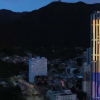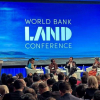The city Administration presented the 2022 Local Voluntary Report (VLR) with Bogotá's main advances in the Sustainable Development Goals (SDGs) and the strategies that are underway to accelerate their fulfillment.
The report aligns with the Colombian national priorities and commitments of the SDGs. Bogotá implemented a comprehensive methodology for the elaboration of the VLR that showcase the city’s progress, not only the efforts of the administration. It includes experiences from the private sector, civil society organizations and academia.
Contenidos relacionados
Bogota's VLR mainly targets 5 SDGs, prioritized according to the main city's concerns and which in turn are drivers of other SDGs:
- SDG 1. No poverty
- SDG 5. Gender equality
- SDG 8. Decent work and economic growth
- SDG 11. Sustainable cities and communities
- SDG 13. Climate action
SDG 1 – No poverty
- Thanks to efforts in monetary transfers, increased poverty has been mitigated. In 2021, monetary poverty in Bogotá was reduced to 35.8% from 40,1% in 2020, extreme poverty decreased from 13,3% to 9,4% and multidimensional poverty decreased from 7,1% to 5,7%. Without the transfers from the district and other sources from the nation, extreme poverty would be 2.3 percentage points and monetary poverty would be 1.9 points higher. This means a reduction of 191,660 people in extreme poverty and 158,209 in monetary poverty, mainly due to the implementation of Guaranteed Minimum Income (GMI). Our estimates project a decrease of monetary poverty of 33,4% for 2022 and 33,4% In 2023.
- Over 3.2 (3,38 to date) million people have benefited from the GMI, with close to USD 300 million delivered in monetary transfers.
- Zero Hunger strategy has benefited more than 226.000 people in the last three years through community meals, food vouchers and baskets.
- More than 18,000 vulnerable young people were engaged through “Parceros”, a monetary transfer program (which provides USD 125 per month for 6 months), with access to employment, education, vocational training, and free time activities.
SDG 5 – Gender equality
- Bogotá created the District Care System to advance in the development of skills, the fulfillment of women's rights, and the training of men and women in caregiving, among other actions, articulated within a set of existing and new services offered by the city. Currently, this System operates through 17 Care Blocks which correspond to geographic areas.
- The Care System to date, has provided over 300,000 care services and has aided 230,000 people through the Care Blocks with the integration of the services of eight entities of the District Administration, including the Women's sector.
SDG 8 – Decent work and economic growth
- More than 176.000 people benefited from the district's job training programs.
- Over 480.000 job located and managed by the district, over 70.000 for young people and another 70.000 for women.
- The district provided more than USD 7.2 million in credit lines to support entrepreneurs and business owners during the pandemic.
SDG 11 – Sustainable cities and communities
- In Bogotá's Land Use Plan (POT), adopted in 2021, mobility is incorporated into what is called the "Functional and care structure", which integrates systems of public space, sustainable multimodal mobility, public facilities, and services to ensure a support infrastructure in line with the planning objectives.
- Looking ahead to 2035, Bogotá plans to have 80 kilometers of metro lines, 100 km of RegionalTram lines, 154 km of high-capacity green corridors, 25 km of the first green corridor on the “Carrera Séptima”, 20 km of aerial cables, 19 km of cycling infrastructure with the "Cicloalameda Medio Milenio" and medium-capacity green corridors, along with their respective multimodal areas.
- Bogotá has eleven additional partial development plans, which are the urban planning standard to guide the construction of more than 66,000 housing units for vulnerable families.
- "Solidarity Renting", aims to support the rental expenses of vulnerable households partially or totally. As of December 2022, 14,504 subsidies (USD 67 per household/per month) have been granted for each household to cover rent for up to two months.
- "Mi Ahorro, Mi Hogar", is intended to provide a cash contribution to low-income households headed by women. This contribution is provided for a period of up to 12 months and has a monthly value of USD 165, which must be used to cover the monthly rent of a housing unit partially or totally. As of December 2022, a total of 3,907 subsidies have been assigned under this program.
- In housing acquisition, between 2020 and 2022, 8,644 subsidies have been allocated, within the framework of the Program for the Promotion of Access to Social Housing – Mi Casa Ya, Preferential Offer, and in inter-administrative agreements signed with different entities. As for housing improvements, 2,911 subsidies have been assigned in the urban area with 182 improvements for rural housing between 2020 and 2022.
- As of December 2022, the Social Public Curator's Office has issued 750 recognition acts for existing buildings.
- Between 2020 and 2022, 2,345 land titles for low-income families were issued in neighborhoods of informal origin.
SDG 13 – Climate action
- In Bogotá's Land Use Plan (POT), adopted in 2021, mobility is incorporated into what is called the "Functional and care structure", which integrates systems of public space, sustainable multimodal mobility, public facilities, and services to ensure a support infrastructure in line with the planning objectives.
- Looking ahead to 2035, Bogotá plans to have 80 kilometers of metro lines, 100 km of RegionalTram lines, 154 km of high-capacity green corridors, 25 km of the first green corridor on the “Carrera Séptima”, 20 km of aerial cables, 19 km of cycling infrastructure with the "Cicloalameda Medio Milenio" and medium-capacity green corridors, along with their respective multimodal areas.
- Bogotá has eleven additional partial development plans, which are the urban planning standard to guide the construction of more than 66,000 housing units for vulnerable families.
- "Solidarity Renting", aims to support the rental expenses of vulnerable households partially or totally. As of December 2022, 14,504 subsidies (USD 67 per household/per month) have been granted for each household to cover rent for up to two months.
- "Mi Ahorro, Mi Hogar", is intended to provide a cash contribution to low-income households headed by women. This contribution is provided for a period of up to 12 months and has a monthly value of USD 165, which must be used to cover the monthly rent of a housing unit partially or totally. As of December 2022, a total of 3,907 subsidies have been assigned under this program.
- In housing acquisition, between 2020 and 2022, 8,644 subsidies have been allocated, within the framework of the Program for the Promotion of Access to Social Housing – Mi Casa Ya, Preferential Offer, and in inter-administrative agreements signed with different entities. As for housing improvements, 2,911 subsidies have been assigned in the urban area with 182 improvements for rural housing between 2020 and 2022.
- As of December 2022, the Social Public Curator's Office has issued 750 recognition acts for existing buildings.
- Between 2020 and 2022, 2,345 land titles for low-income families were issued in neighborhoods of informal origin.
- The Climate Action Plan (PAC) was presented in April 2021 as a roadmap for the city to meet its goals of mitigating and adapting to climate change.
- Several achievements are worth highlighting; the acquisition of 1480 electric buses; support for companies in Bogota to improve their water and energy use and transition to sustainable practices; the formulation and implementation of a city financing program for small and medium enterprises to reduce emissions through appropriate technologies.
- In accordance with the PAC, Bogota has taken actions in all sectors (transportation, public services, waste, ecosystems, buildings) aimed at reducing GHG emissions, including:
- Operation of the wastewater treatment plant -PTAR Salitre,
- The Greening of Bogotá Program, whereby as of 2022, 347,747 plants have been sown in Bogotá and conservation agreements were signed on more than 52 hectares to consolidate the Thomas van der Hammen forest reserve.
- In urban agriculture, 13,064 urban vegetable gardens were enhanced with the delivery of supplies ((substrate, seeds, tools, and seedlings).
- Mujeres que reverdecen program was launched, offering conditional cash transfers to 5,000 women in a situation of vulnerability in exchange for their work in improving Bogotá's green cover.
- Issuance of a regulation mandating the compensation of planting five trees for every one that is cut down, which will help mitigate heat islands and contribute to a greener city.
- Bogotá committed to mitigating GHG emissions with measures such as the construction and commissioning of the First Metro Line, which, according to mitigation potential models, will reduce CO2 emissions by 0.91 million tons by 2030.
- The initial phase of the adoption and implementation of the Public Bicycle Policy began in 2021.
Accelerating the achievement of the SDGs
Bogotá is working on the following actions aimed at increasing efficiency and effectiveness in achieving the 2030 Agenda:
- Strengthening the articulation between different planning instruments, such as the Land Use Plan, Public Policies, and the City Development Plan, around the 2030 Agenda.
- Improving the quality of statistical information as a basis for monitoring compliance with the SDGs and for decision-making associated with their implementation.
- Consolidating the governance structure
The proposal for achieving the SDGs by the city administration involves reorienting institutional adaptation processes to address challenges like pandemic management and urbanization. The actions planned aim to improve specific aspects that lead to greater efficiency in the implementation of the 2030 Agenda:
- A diagnosis to analyze the progress in compliance until 2022
- An analysis of the investment for the 2023 fiscal year and its contribution to fulfilling the goals of each SDG.
- Recommendations regarding the governance scheme
- Suggestions to strengthen the generation and use of statistical information.
- Definition of annual targets that will enable compliance with the SDGs by 2030.
Here you can find the full document of the Voluntary Local Review of the SDGs: Click here.




